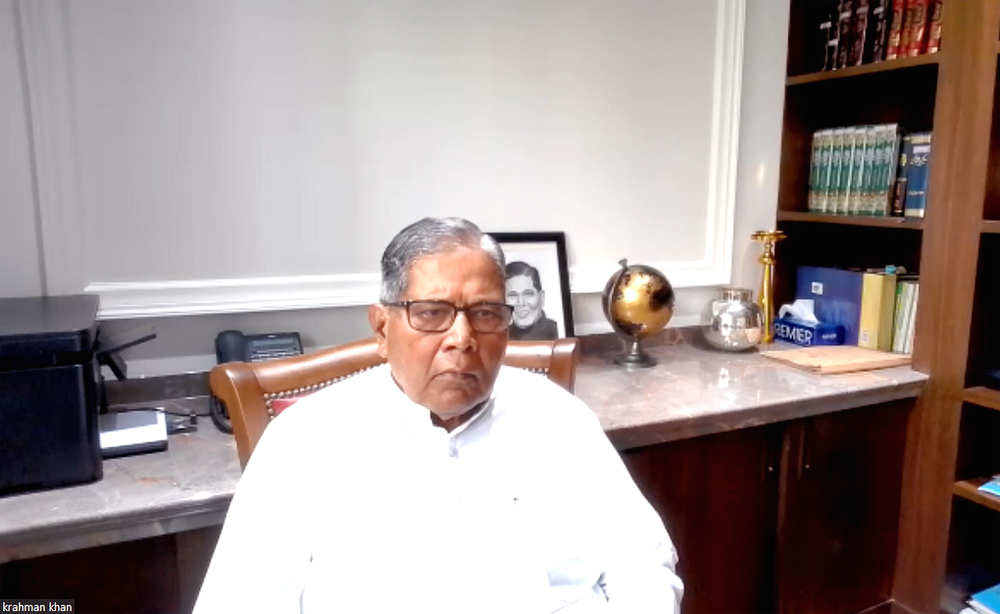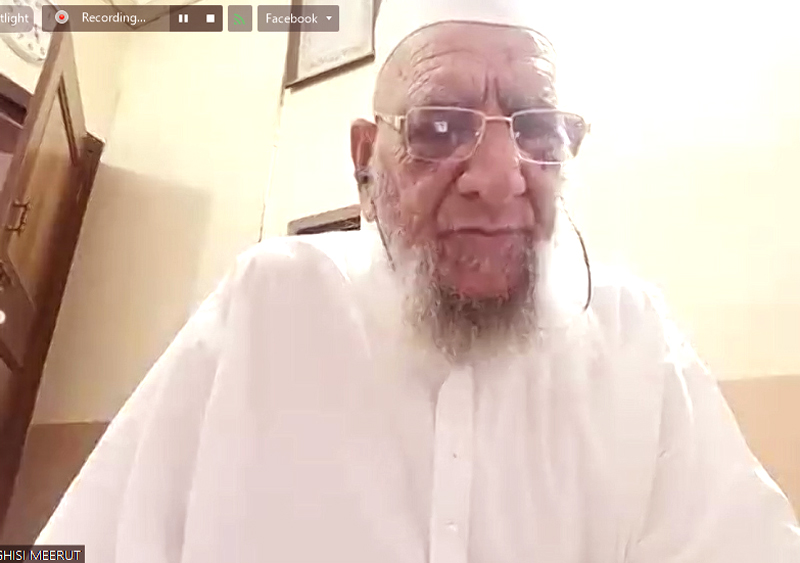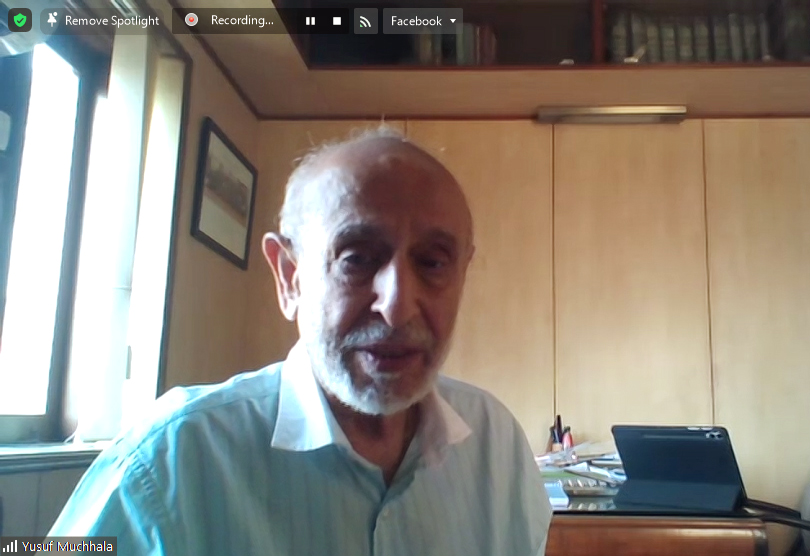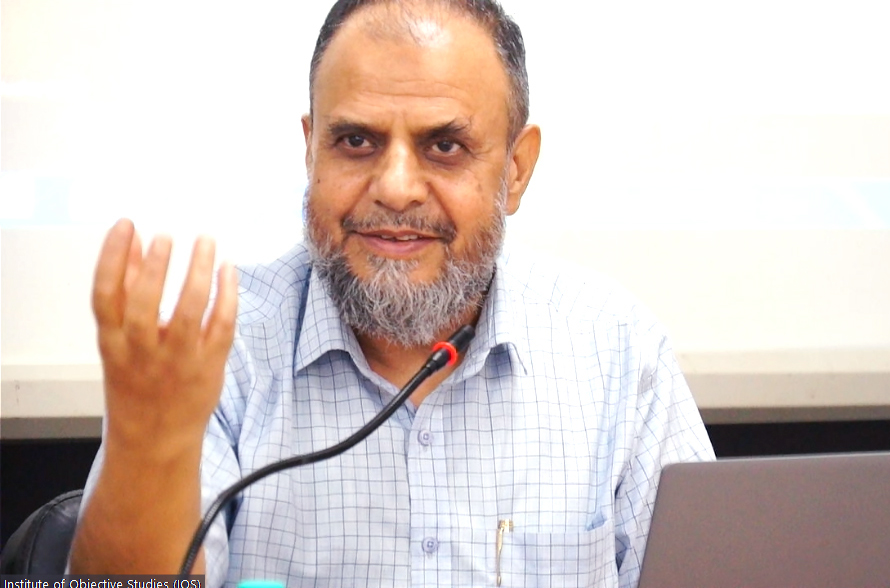New Delhi: An open-house discussion on “Waqf (Amendment) Bill 2024” was organised by the Institute of Objective Studies at its auditorium on August 16, 2024.
.jpg)
Opening the discussion, Professor Emeritus, Islamic Studies, Jamia Millia Islamia, Prof. Akhtarul Wasey said, “Waqf is not a new thing as the Prophet (PBUH) liked it much. Waqf is dedicated for the pleasure of Allah and the welfare of the community.” He questioned the timing of bringing the Bill. The government woke up in 2024 after the target to achieve 400 plus seats in parliamentary election came a cropper. The proposed amendment Bill was aimed at targeting Muslims. Under the new provisions, district magistrates have been given the power to decide if an asset was Waqf or not. Being a government servant, a district magistrate could not remain neutral. He could not go against the wishes of the government. He asserted that the inclusion of non-Muslims as members of the Waqf Council could never be accepted. If Waqf Act had to be amended, it could be done keeping in view the wishes of the waqif who executed the waqf or the Aimma (Imams), he held.
Prof. Wasey refuted the contention that the Sachar Committee had recommended amendment to the Waqf Act. In fact, the BJP had opposed the Committee and its recommendations at that time. He alleged that the BJP launched a sustained campaign against the Topi (head gear) and the beard. “We can not allow this to happen”. He praised the Samajwadi Party supremo, Akhilesh Yadav for his statement supporting Muslims’ concern over the motive of the government in introducing the Bill. He asked the senior congress leader and the Leader of Opposition in the Lok Sabha, Rahul Gandhi to also speak on the subject. He urged the Muslim leadership to garner support of the NDA partners like, Telugu Desham Chief, Chandrababu Naidu, JDU leader and Bihar Chief Minister, Nitish Kumar, Lok Jan Shakti Party Chief, Chiragh Paswan and Rashtriya Lok Dal Chief, Jayant Chowdhary. He reiterated that Muslims could sacrifice their lives but would never compromise on faith. He called for launching the country-wide campaign against ill-motive of the government. This campaign should also include non-Muslims. He questioned if the government had the temerity to interfere with the religious affairs of Sikhs.

Former union minister for Minority Affairs, K. Rahman Khan commented that the Bill sought to revert to pre-1995 position. The Arbitration Act was proposed to be applied to the Amendment Act. If the said Act was enforced then the encroachment on waqf land and property which was existing since long could not be removed. Many public sector units which were occupying space on waqf land could not be dispossessed. He said that the proposed Act conferred sweeping powers to district collectors. Collectors could not remain unbiased because they were supposed to work as directed by the government. This government wanted to give all powers relating the waqf to collectors. Collectors would enjoy all powers of decision making in respect of waqf. They would decide the status of the property, whether it was waqf or not, he noted.
K. Rahman Khan pointed out that the government wanted to abolish waqf. That was the reason for deleting 12 sections in the new Bill. All the Muslims should protest against the Bill and compel the government to withdraw it. He held that Bill was sans transparency. Besides, the Bill had made 40 amendments. He asked the Muslim organizations to come forward and oppose the Bill. He also impressed upon them to contact leaders of different political parties in order to enlighten them on the Bill. He was skeptical about the resolution of issues in the Joint Parliamentary Committee on Waqf Amendment Bill 2024.
.jpg)
Former judge of the Allahabad High Court, Justice Zakiullah Khan stated that waqf was in existence since ages. Waqf was aimed at benefiting the Muslim community in terms of education, medical treatment; etc. He said that any adult person can execute waqf in his life-line. The first Waqf Act was made by the Britishers with the intention to take control over waqf property. Thereafter Acts were passed in 1938 and 1940. In 1956 a complete Act was made followed by another Act in 1960. He categorically stated that waqfs could be managed by Muslims only, though a non-Muslim could also will his property as waqf. The role of a non-Muslim was confined to the execution of waqf. He said that the Act of 1995 was comprehensive and inclusive as necessary amendments were made in it. Since no rules were framed till sometime after Partition, refugees from a cross the border were allotted land on rent at nominal rates. But after sometime, the allottees stopped paying rent. The income by way of rent was proposed to be utilized for opening and running colleges and schools.
Justice Zakiullah Khan expressed dismay that the institutions of higher learning like, the Jamia Millia Islamia and Aligarh Muslim University that symbolized the aspirations of Muslims, had not been granted the status of a minority institution. Referring to the appointment of the chief executive officer of the waqf board, he said that in Uttar Pradesh, it had been statutorily provided that the CEO of the state waqf board would not be below the rank of the Additional District Magistrate. Surprisingly enough, the state Shia Waqf Board was headed by an Ayurvedic doctor. The Amendment Bill should have left no room for mischievous persons to be a part of the waqf management. The proposed Bill had made the collector the sole authority to decide about the status of the waqf. No district magistrate could dare go against the policy of the government. He could not function independently of the government; he could not remain unbiased, he noted.
Justice Khan raised the question of the rule of law in U.P. and Madhya Pradesh where houses of a particular community were being bulldozed without following proper procedure. This was nothing but a sheer mischief. This Amendment Bill had been brought to subject Muslims to harassment. By changing the name of the Act, they were depriving poor Muslims of their right. They were also making the Limitation Act enforceable in the amended law. This was aimed at declaring a waqf property as non-waqf. After 1857, the English government grabbed waqf land and conversed it into Nazul land. This government also was trying to convert waqf land into Nazul land. They were busy preparing a framework for Nazul land to make a new waqf law. They completely dismantled the structure of waqf. He called upon the beneficiaries to educate the members of the community about the purpose and management of waqf. He said, “once waqf shall always remain waqf”. He urged the community leaders to remain united for the protection of waqf property. Waqf land could be used for opening a dispensary for the use of the poor and deprived people of the community. Citing a glaring example of the occupation of waqf land, he said that Ambani’s 26-story building in Mumbai was built on the waqf land. In a similar case in NOIDA, a temple came up on the Waqf land earmarked for the graveyard. This Bill should not be allowed to be passed in Parliament. A campaign to create awareness among Muslims about the Bill should be launched, he added.

President of the All India Milli Council, Maulana Hakim Abdullah Mughisi, observed that the open-house discussion on the issue was well-timed. He expressed that the unity in opposition to the Bill displayed by the community leaders, ulema, Imams and the Members of the Parliament would continue till the Bill was withdrawn. He assured that he would work shoulder to shoulder with the opponents of the Bill. But the protest against the proposed law should continue because it was a ploy to dismantle the very system of Awqaf, he stressed.

Senior lawyer of the Supreme Court, Yusuf Hatim Muchhala congratulated the IOS for organizing the discussion on a very important issue. The matter had been referred to the JPC for examination. He disagreed with K. Rahman Khan’s view that the JPC would do nothing in the matter. He opined that giving power of waqf commissioner to district magistrates was against the basic principles of law. “Collector is nothing, but a paid officer of the government. Waqf property is for the benefit of the downtrodden in the Muslim community”. He saw in the Bill a hidden motive to grab waqf land. The collector was a mere puppet of the government. They could not divide Muslims into two categories. While the stakeholders knew nothing about the member of the JPC, the issue was very serious for the community. He pleaded that the title of the land should be decided by a judicial officer. He also quoted the late Qazi Mujahidul Islam that the work of judicial review should be assigned to the Shariah Court. He suggested that a committee should be formed to take necessary steps look after the matter. He also said that seminars similar to this should be organised everywhere to sensitise the community members about the Bill. He asked the stakeholders to prepare papers for presentation to the JPC.
Javed Alam, an active worker for the cause of waqf, held that the Bill was based on UP model. He said that a survey of the waqf properties in the state was undertaken by the government. Non-Muslims were sensitized about the waqf property and its market value. He was of the view that the JPC would do nothing worthwhile. He called for mass awakening and mass mobilization of Muslims for the cause.
Raees Ahmed, an advocate from Delhi informed that there was a big graveyard near the airport in the city. He said that about 522 graveyards belonging to Muslims had disappeared with the passage of time. He suggested that small videos on Awqaf like the ones made by Prof. Faizan Mustafa, should be shot and released to create awareness among Muslims.

Chairman of the IOS, Prof. M. Afzal Wani, said that a judicial authority should be put in place to decide whether a property was waqf or not. He noted that the waqf property was a sentimental creation which connected the waqif with Allah. If the waqif’s intention was diluted, then the waqf would lose its sanctity. The spirit behind willing a waqf property should be purely religious. Waqf came under the Shariah category. Thus the real property should be tied up. One who determined the property should be of the same faith. He held that the waqf was a charitable institution and its benefits would accrue to non-Muslims as well during natural calamities, like floods and drought. He repented that though the Muslims had property, they did not know how to manage it. Allah had given gold mines to Muslims, but they were in a slumber. He said that the waqf property should remain in the hands of a faithful. He called for working devotedly, but with detachment. He counselled against giving the property to a novice. He briefly spoke about the IOS. He said that the Institute was engaged in promoting constitutionalism and federalism.